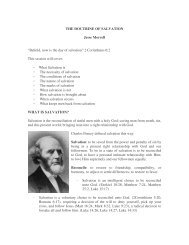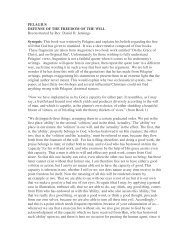Does_God_Take_Away_Free_Will_Jesse_Morrell 2.pdf - PinPoint ...
Does_God_Take_Away_Free_Will_Jesse_Morrell 2.pdf - PinPoint ...
Does_God_Take_Away_Free_Will_Jesse_Morrell 2.pdf - PinPoint ...
Create successful ePaper yourself
Turn your PDF publications into a flip-book with our unique Google optimized e-Paper software.
APPENDIX A<br />
SUPPORTING QUOTES FOR THE GOVERNMENTAL<br />
ATONEMENT<br />
THE MORAL GOVERNMENT OF GOD<br />
“That creation and moral government, including both law<br />
and gospel, together with the penal sanctions are only efforts of<br />
benevolence, to secure the highest good.” Charles G. Finney (1851<br />
Edition of Systematic Theology, p. 60)<br />
“That <strong>God</strong>’s ultimate end, in all he does, or omits, is the<br />
highest well-being of himself, and of the universe, and that in all<br />
his acts and dispensations, his ultimate object is the promotion of<br />
this end.” Charles G. Finney (1851 Edition of Systematic<br />
Theology, p. 59)<br />
“<strong>God</strong> acts, not from any contracted, selfish motives, but<br />
from the most noble benevolence and regard to the public good. It<br />
hath often and long since been made a matter of objection to the<br />
doctrines of future punishment of the wicked, and the atonement of<br />
Christ, that they represent the Deity as having regard merely to his<br />
own honor and dignity, and not to the good of his creatures, and<br />
therefore represents him as deficient in goodness.” Jonathon<br />
Edwards Jr. (Inferences and Reflections on Atonement, p. 6)<br />
"<strong>God</strong> legislates, not arbitrarily or oppressively, but wisely<br />
and equitably." John Miley (Theory and Scripture Interpretation, p.<br />
2)<br />
THE PURPOSE OF LAWS<br />
"Let it be distinctly understood that the divine law<br />
originates in <strong>God</strong>'s benevolence, and has no other than a<br />
benevolent end in view. It has revealed only and solely to promote<br />
the greatest possible good, by means of obedience. Charles Finney<br />
(The Oberlin Evangelist; July 30, 1856; On the Atonement, p. 3)<br />
“Moral Law is thus the expression of the principles of<br />
moral government. While the expression of moral law proceeds<br />
from the divine will, the action prescribed originates in the divine<br />
intelligence. Moral law is not something which may be altered or<br />
changed in our present circumstances. It is that precise prescription<br />
of action in the relation of moral beings that shall result in the<br />
happiness of all. The absolutely intelligent <strong>God</strong>, in a state of love<br />
or voluntary benevolence, views objectively what is the only<br />
conduct in His moral creatures that can result in happiness to<br />
Himself and to them.” Gordon Olson (The Moral Government of<br />
<strong>God</strong>, Published by Revival Theology Promotions, p. 12)<br />
“The moral law is like a fence on a farm. It not only shows<br />
ownership but provides protection.” Harry Conn (Four Trojan<br />
Horses, Published by Mott Media, p. 79)<br />
“Isaiah 9:6-7…. As government increases, peace<br />
increases… government is meant to increase peace. This is the<br />
basic reason for government. Without government there is chaos.<br />
Government brings order, and as a result, peace.” Michael Saia<br />
(Understanding the Cross, Published by Xulon, p. 59).<br />
THE PURPOSE OF PUNISHMENT<br />
“But in order to a moral law, there must be a penalty;<br />
otherwise it would be mere advice, but no law.” Jonathon Edwards<br />
Jr. (The Necessity of the Atonement, p. 4)<br />
“Consequences” are “the enforcement of moral<br />
government… The idea of sanctions, therefore, is unavoidably<br />
associated with moral government and moral law. It is the method<br />
of enforcing moral government.” Gordon Olson (The Moral<br />
Government of <strong>God</strong>, Published by Revival Theology Promotions,<br />
p. 36)<br />
“The purpose of punishment is to prevent sin, in the<br />
individual and in the society. It is not primarily to reform the<br />
guilty. A moral government seeks to evaluate properly the<br />
seriousness of a given crime against society and prevent its<br />
repetition by exhibiting an appropriate punishment. Punishment is<br />
a public declaration of the fact that disobedience and rebellion<br />
against <strong>God</strong> will not be tolerated, and thus becomes a barrier to all<br />
who are considering the ways of lawlessness and incompliance.”


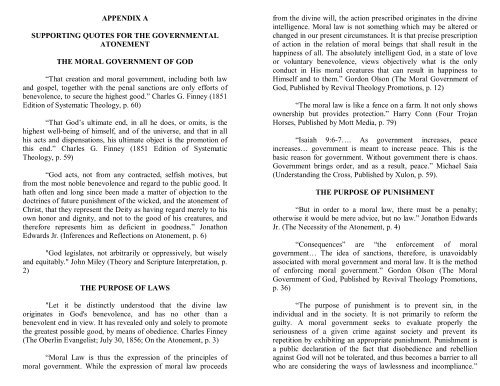

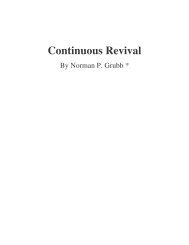
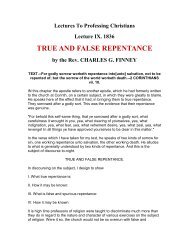
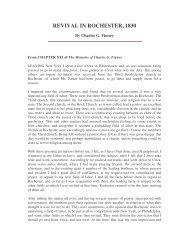

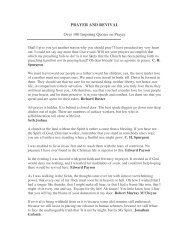
![[PDF] SIX DAYS OR MILLIONS OF YEARS? - Answers in Genesis](https://img.yumpu.com/34887318/1/190x245/pdf-six-days-or-millions-of-years-answers-in-genesis.jpg?quality=85)




